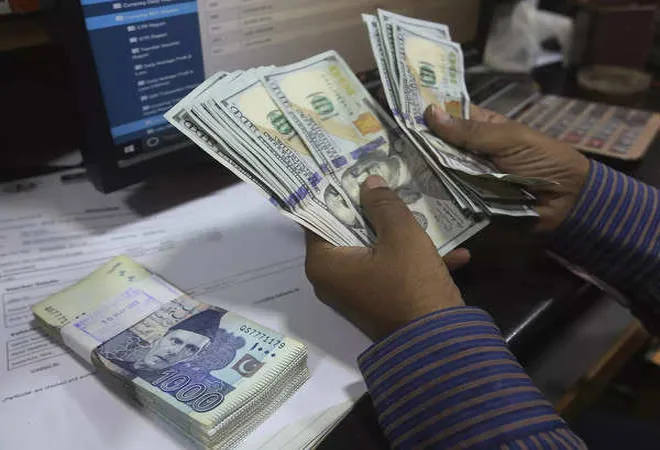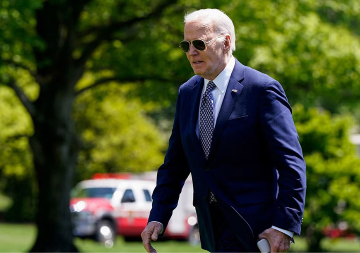
On 9 May, Pakistan’s Finance Minister Ishaq Dar will present the annual budget for the Financial Year 2023-24. The budget will be passed under what are probably the most difficult and trying circumstances in Pakistan's history. Looking at the lifestyles of the rich, famous, and powerful elite of the country, no one will ever say that these are really desperate times for the Pakistan economy that has been running on fumes for months, and now, even the fumes are running out.
The economic crisis has become intractable, especially because of the political crisis that has been running in parallel—Imran Khan versus the Pakistani state. Complicating matters further for the budget makers are the general elections that are due later this year in October. The incumbents are scheduled to demit office in the second week of August, after which a caretaker government will steer things until elections. This means that there is no incentive for the government to behave fiscally responsible because once they leave office, the caretakers and their underwriters—Pakistan Army—will have to carry the can of the economy.
The economic crisis has become intractable, especially because of the political crisis that has been running in parallel—Imran Khan versus the Pakistani state.
Election year budget
Normally, election year budgets are expansionary and profligate. The problem for Dar and Company is that there is no fiscal space for throwing money to win votes. And yet, political survival of the incumbents demands throwing fiscal responsibility to the winds. This means that Ishaq Dar will have to do a
balancing act between the electoral compulsions of the coalition partners and the expectations of the International Monetary Fund (IMF) and other lenders. To be able to do this, he will have to pull a rabbit out of his hat using creative figure fudging and innovative accounting. As an accomplished chartered accountant, such cooking of the books is something Dar is quite adept at. What he will try to do is create a feel good factor for the people reeling under tough economic conditions, many of which are the result of Dar’s own economic mismanagement.
Dar will sell hope of a better future by trying to convince the people that the worst is over—however, it is yet to come—and that the economy has stabilised and will improve in the months ahead. He will have to do this without riling the IMF, international donors, and financial markets. No one in the hard-nosed world of international finance will be taken in by the Pakistani version of voodoo economics, also known as Daronomics. Dar’s own credibility is so low that he is not even allowed to sit in on meetings with IMF anymore. The IMF has already
warned that the restoration of the programme will depend on the budget and the integrity of the numbers given in it by Dar.
The big problem for Pakistan's economic managers is that the economy is now in such dire straits that putting in place stabilisation measures has become as onerous as undertaking structural reforms. If there is any silver-lining, it is that on the political front, the dismantling of Imran Khan’s Pakistan Tehreek-e-Insaf (PTI) has created some space for the Pakistan Muslim League - Nawaz (PMLN) led ruling coalition to tinker around with the economy and prevent its complete meltdown. But given the political dynamics within the coalition, this space will be wasted. The PMLN has received all the flak for the economic crisis, while its coalition partners have escaped relatively lightly. It is now an imperative for PMLN to recover some lost ground, even if it means being fiscally irresponsible. This is also politically necessary since there are serious doubts arising within PMLN ranks on how much the Pakistan Army will back it to form the next government. The Pakistan Peoples Party and the flotsam and jetsam of PTI are also manoeuvring to gain the affections of the military to back their bid to head the next government.
The IMF has already warned that the restoration of the programme will depend on the budget and the integrity of the numbers given in it by Dar.
In a debt trap
Needless to say, whoever forms the next government will not just be wearing a crown of thorns, but also walking a minefield with a crown of bombs that could blow up anytime. Even if, as is being speculated, the caretaker government comes in for an extended time period, the military will have to take the flak for the economic difficulties that will befall the people. To put it simply, Pakistan is no longer a viable economy. The country is bankrupt, only it hasn’t declared itself so and gone into receivership. It is caught in a debt trap coming out of which is not possible without either a massive debt restructuring or a debt default, both of which will be seriously disruptive and have a devastating impact. From the available projections for the next fiscal year i.e., Financial Year 2024, the debt servicing obligations of the federal government will be around Rs 1 trillion more than the revenue. In other words, Pakistan will not just be borrowing money to pay for defence expense, development expenses, subsidies, and running of civil government, but it will also be borrowing money to service its debt.
The outgoing fiscal year has seen GDP growth of just 0.29 percent. Even this is believed to be a number inflated by Dar’s creative book-keeping skills because independent economists have calculated a negative growth of around 1-2 percent. For FY24, Pakistan is targeting a growth rate of 3.5 percent; this means going in for an expansionary budget. According to reports, the FY24 budget size will be around Rs 14 trillion, an astounding 50 percent larger than the FY23 budget. Given that the IMF program is not going to be restored—which means that foreign funding is going to be severely squeezed—where will the money come from to fund this budget? Some reports claim that Pakistan intends to raise US $2 billion in Eurobonds. For anyone to imagine that this is possible, is to live in an alternate reality because the yields on Pakistan are currently at default rates. In any case, Pakistan has around US $25 billion of debt obligations in FY24 and even if it was able to issue Eurobonds of US $2 billion and get roll overs from friendly countries plus some more fund infusions, it will fall short.
Pakistan will not just be borrowing money to pay for defence expense, development expenses, subsidies, and running of civil government, but it will also be borrowing money to service its debt.
To achieve a GDP growth of 3.5 percent, Pakistan will have to remove the squeeze on imports. This means that it will run a big current account deficit that will add to foreign exchange requirement in the next fiscal, which means that Pakistan will not only need around US $25 billion for meeting debt obligations but also an addition US $6-7 billion of current account deficit. In FY23, the import restrictions resulted in a sharp downturn in industrial production. It also affected revenue collection because customs duties came down. The Pakistan Rupee—which has already breached the Rs 300 to a US dollar mark in the open market—will weaken further. No one is sure where it will find its level. But given that the budget for FY24 is predicated on Rupee value of 290 to a dollar, it is clear that all calculations based on this fictitious exchange rate will be meaningless. With the Rupee weakening, inflation is likely to spike further. In FY23, it touched the 40 percent mark with prices of most essential commodities almost touching the 50 percent mark. In FY24, the government expects an average inflation rate of just over 20 percent. But this could go up if the Rupee weakens and fuel prices start rising.
The energy economics is already broken. The circular debt in the power sector has crossed the Rs 2.5 trillion mark. Even in the oil sector, the circular debt has breached the half a trillion rupee mark. Pakistan is constrained by sovereign guarantees to alter the contracts of the independent power producers. What is more, the inability to meet payment obligations, including to the Chinese power companies that are owed almost US $1 billion, has fouled up the investment climate. No foreign investor is coming to Pakistan and even the Chinese are reluctant. Worse, domestic
investment has also fallen to around 13.5 percent. Meanwhile, the public sector enterprises continue to bleed the economy but there is no real prospect of getting rid of them, partly because of political considerations, partly because privatisation is an extremely complex process with innumerable obstacles (including the judiciary), and partly because most of these enterprises have no takers. The chances of cutting defence expenditures are next to zero. Pakistan will be lucky if the military agrees to freeze its budget at the FY23 level. But with security threats mounting—the resurgent Tehrik-e-Taliban Pakistan is on the rampage once again and relations with India have not eased—it will be difficult to put a lid of defence expenditure, even less so because the government depends on the military for its survival.
To achieve a GDP growth of 3.5 percent, Pakistan will have to remove the squeeze on imports.
Given the scale of problems and the complex political economy of Pakistan, the budget is really quite a meaningless document. Chances are that Dar will try to pull a fast one on everyone, but no one, not the IMF and not the Pakistani public, will bite. But in the process, he will have laid a minefield that will be virtually impossible for the next government to negotiate.
Sushant Sareen is Senior Fellow at Observer Research Foundation.
The views expressed above belong to the author(s). ORF research and analyses now available on Telegram! Click here to access our curated content — blogs, longforms and interviews.



 On 9 May, Pakistan’s Finance Minister Ishaq Dar will present the annual budget for the Financial Year 2023-24. The budget will be passed under what are probably the most difficult and trying circumstances in Pakistan's history. Looking at the lifestyles of the rich, famous, and powerful elite of the country, no one will ever say that these are really desperate times for the Pakistan economy that has been running on fumes for months, and now, even the fumes are running out.
The economic crisis has become intractable, especially because of the political crisis that has been running in parallel—Imran Khan versus the Pakistani state. Complicating matters further for the budget makers are the general elections that are due later this year in October. The incumbents are scheduled to demit office in the second week of August, after which a caretaker government will steer things until elections. This means that there is no incentive for the government to behave fiscally responsible because once they leave office, the caretakers and their underwriters—Pakistan Army—will have to carry the can of the economy.
On 9 May, Pakistan’s Finance Minister Ishaq Dar will present the annual budget for the Financial Year 2023-24. The budget will be passed under what are probably the most difficult and trying circumstances in Pakistan's history. Looking at the lifestyles of the rich, famous, and powerful elite of the country, no one will ever say that these are really desperate times for the Pakistan economy that has been running on fumes for months, and now, even the fumes are running out.
The economic crisis has become intractable, especially because of the political crisis that has been running in parallel—Imran Khan versus the Pakistani state. Complicating matters further for the budget makers are the general elections that are due later this year in October. The incumbents are scheduled to demit office in the second week of August, after which a caretaker government will steer things until elections. This means that there is no incentive for the government to behave fiscally responsible because once they leave office, the caretakers and their underwriters—Pakistan Army—will have to carry the can of the economy.
 PREV
PREV


